《大学基础英语》课程教学资源(教学大纲)英语专业四级语法总结
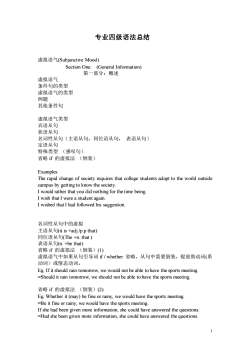
专业四级语法总结虚拟语气(SubjunctiveMood)SectionOne:(General Information)第一部分:概述虚拟语气条件句的类型虚拟语气的类型例题其他条件句虚拟语气类型宾语从句状语从句名词性从句(主语从句,同位语从句,表语从句)定语从句特殊类型(感叹句)省略if的虚拟法(倒装)ExamplesThe rapid change of society requires that college students adapt to the world outsidecampus bygettingtoknowthe society.I would rather that you did nothing for the time beingI wish that I were a student again.I wished that I had followed his suggestion.名词性从句中的虚拟主语从句(itis+adj./p.pthat)同位语从句(The+n.that)表语从句(n.+bethat)省略if的虚拟法(倒装)(1)虚拟语气中如果从句引导词if/whether省略,从句中需要倒装,提前助动词(系动词)或情态动词。Eg. If it should rain tomorrow, we would not be able to have the sports meeting.=Should it rain tomorrow, we should notbe ableto have the sports meeting省略if的虚拟法(倒装)(②)Eg. Whether it (may) be fine or rainy, we would have the sports meeting.=Be it fine or rainy, we would have the sports meetingIfshehadbeengivenmoreinformation,shecouldhaveansweredthequestions=Had she been given more information, she could have answered the questions1
1 专业四级语法总结 虚拟语气(Subjunctive Mood) Section One: (General Information) 第一部分:概述 虚拟语气 条件句的类型 虚拟语气的类型 例题 其他条件句 虚拟语气类型 宾语从句 状语从句 名词性从句(主语从句,同位语从句, 表语从句) 定语从句 特殊类型 (感叹句) 省略 if 的虚拟法 (倒装) Examples The rapid change of society requires that college students adapt to the world outside campus by getting to know the society. I would rather that you did nothing for the time being. I wish that I were a student again. I wished that I had followed his suggestion. 名词性从句中的虚拟 主语从句(it is +adj./p.p that) 同位语从句(The +n. that ) 表语从句(n. +be that) 省略 if 的虚拟法 (倒装)(1) 虚拟语气中如果从句引导词 if / whether 省略,从句中需要倒装,提前助动词(系 动词)或情态动词。 Eg. If it should rain tomorrow, we would not be able to have the sports meeting. =Should it rain tomorrow, we should not be able to have the sports meeting. 省略 if 的虚拟法 (倒装)(2) Eg. Whether it (may) be fine or rainy, we would have the sports meeting. =Be it fine or rainy, we would have the sports meeting. If she had been given more information, she could have answered the questions. =Had she been given more information, she could have answered the questions
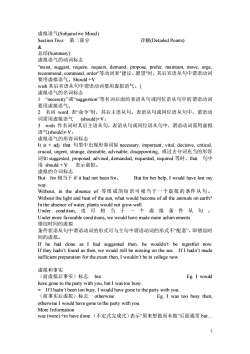
虚拟语气(SubjunctiveMood)SectionTwo:第二部分详解(DetailedPoints)&总结(Summary)虚拟语气的动词标志"insist, suggest, require, request, demand, propose, prefer, maintain, move, urge,recommend,command,order"等动词表"建议、愿望"时,其后宾语从句中谓语动词要用虚拟语气。Should+Vwish其后宾语从句中谓语动词要用虚拟语气。(虚拟语气的名词标志1“necessity"或“suggestion"等名词后面的表语从句或同位语从句中的谓语动词要用虚拟语气。2名词word表“命令"时,其后主语从句、表语从句或同位语从句中,谓语动词需用虚拟语气(should)+V。3wish作名词时其后主语从句,表语从句或同位语从句中,谓语动词需用虚拟语气(should)+V。虚拟语气的形容词标志Itis+adj.that句型中出现形容词如necessary,important,vitaldecisive,critical,crucial,urgent,strange,desirableadvisable,disappointing,或过去分词充当的形容词如suggested,proposed,advised,demanded,requested,required等时,that句中用should+V表示虚拟。虚拟的介词标志Butfor相当于ifithadnotbeenfor。But for her help, I would have lost mywayWithout,inthe absence of等组成的短语可相当于一个虚拟的条件从句。Withoutthelight and heat of the sun,what would becomeof all the animals onearth?In the absence of water,plantswould not grow well.Under..condition,也可相当于一个虚拟条件从句Under more favorable conditions, we would have made more achievements.错综时间的虚拟条件状语从句中谓语动词的形式可与主句中谓语动词的形式不“配套”,即错综时间的虚拟。If he had done as I had suggested then, he wouldn't be regretful now.If they hadn't found us then, we would still be missing on the sea.IfI hadn't madesufficientpreparationfortheexamthen,Iwouldn'tbeincollegenow.虚拟和事实(前虚拟后事实)标志:butEg.I wouldhave gone to the party with you, but I was too busy.=IfI hadn't been too busy, I would have gone to the party with you.(前事实后虚拟)标志:otherwiseEg. I was too busy then,otherwise I would have gone to the party with you.MoreInformationwas(were)+tohavedone(不定式完成式)表示“原来想做而未做"后面通常but..2
2 虚拟语气(Subjunctive Mood) Section Two: 第二部分 详解(Detailed Points) & 总结(Summary) 虚拟语气的动词标志 "insist, suggest, require, request, demand, propose, prefer, maintain, move, urge, recommend, command, order"等动词表"建议、愿望"时,其后宾语从句中谓语动词 要用虚拟语气。Should +V wish 其后宾语从句中谓语动词要用虚拟语气。{ 虚拟语气的名词标志 1 “necessity”或“suggestion”等名词后面的表语从句或同位语从句中的谓语动词 要用虚拟语气。 2 名词 word 表“命令”时,其后主语从句、表语从句或同位语从句中,谓语动 词需用虚拟语气 (should)+V。 3 wish 作名词时其后主语从句,表语从句或同位语从句中,谓语动词需用虚拟 语气(should)+V。 虚拟语气的形容词标志 It is + adj. that 句型中出现形容词如 necessary, important, vital, decisive, critical, crucial, urgent, strange, desirable, advisable, disappointing, 或过去分词充当的形容 词如 suggested, proposed, advised, demanded, requested, required 等时,that 句中 用 should + V 表示虚拟。 虚拟的介词标志 But for 相当于 if it had not been for。 But for her help, I would have lost my way. Without, in the absence of 等组成的短语可相当于一个虚拟的条件从句。 Without the light and heat of the sun, what would become of all the animals on earth? In the absence of water, plants would not grow well. Under.condition, 也可相当于一个虚拟条件从句。 Under more favorable conditions, we would have made more achievements. 错综时间的虚拟 条件状语从句中谓语动词的形式可与主句中谓语动词的形式不“配套”,即错综时 间的虚拟。 If he had done as I had suggested then, he wouldn’t be regretful now. If they hadn’t found us then, we would still be missing on the sea. If I hadn’t made sufficient preparation for the exam then, I wouldn’t be in college now. 虚拟和事实 (前虚拟后事实)标志: but Eg. I would have gone to the party with you, but I was too busy. = If I hadn’t been too busy, I would have gone to the party with you. (前事实后虚拟)标志: otherwise Eg. I was too busy then, otherwise I would have gone to the party with you. More Information was (were) +to have done (不定式完成式)表示“原来想做而未做”后面通常 but
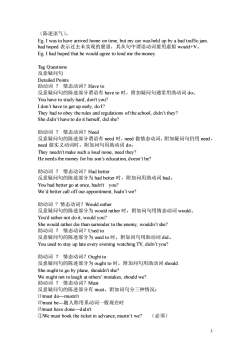
(陈述语气)。Eg.I was to have arrived home on time, but my car was held up by a bad traffic jamhadhoped表示过去未实现的愿望,其从句中谓语动词要用虚拟would+V。Eg. I had hoped that he would agree to lend me the money.Tag Questions反意疑问句Detailed Points助动词?情态动词?Haveto反意疑问句的陈述部分谓语有haveto时,附加疑问句通常用助动词do。You have to study hard, don't you?I don't have to get up early, do I?They had to obey the rules and regulations of the school, didn't they?She didn't have to do it herself, did she?助动词?情态动词?Need反意疑问句的陈述部分谓语有need时,need做情态动词,附加疑问句仍用need,need做实义动词时,附加问句用助动词do。They needn't make such a loud noise, need they?He needs the money for his son's education, doesn't he?助动词?情态动词?Hadbetter反意疑问句的陈述部分为hadbetter时,附加问用助动词had。You had better go at once, hadn't you?We'd better call off our appointment, hadn't we?助动词?情态动词?Wouldrather反意疑问句的陈述部分为wouldrather时,附加问句用情态动词would。You'd rather not do it, would you?She would rather die than surrender to the enemy, wouldn't she?助动词?情态动词?Usedto反意疑问句的陈述部分为usedto时,附加问句用助动词did。You used to stay up late every evening watching TV, didn't you?助动词?情态动词?Oughtto反意疑问句的陈述部分为oughtto时,附加问句用助动词shouldShe ought to go by plane, shouldn't she?We ought not to laugh at others'mistakes, should we?助动词?情态动词?Must反意疑问句的陈述部分有must,附加问句分三种情况:(1)mustdo-mustn't(2)mustbe一随人称用系动词一般现在时(3)must have donedidn't(必须)We must book the ticket in advance, mustn't we?3
3 (陈述语气)。 Eg. I was to have arrived home on time, but my car was held up by a bad traffic jam. had hoped 表示过去未实现的愿望,其从句中谓语动词要用虚拟 would+V。 Eg. I had hoped that he would agree to lend me the money. Tag Questions 反意疑问句 Detailed Points 助动词 ? 情态动词?Have to 反意疑问句的陈述部分谓语有 have to 时,附加疑问句通常用助动词 do。 You have to study hard, don't you? I don’t have to get up early, do I? They had to obey the rules and regulations of the school, didn’t they? She didn’t have to do it herself, did she? 助动词 ? 情态动词?Need 反意疑问句的陈述部分谓语有 need 时,need 做情态动词,附加疑问句仍用 need, need 做实义动词时,附加问句用助动词 do。 They needn't make such a loud noise, need they? He needs the money for his son’s education, doesn’t he? 助动词 ? 情态动词?Had better 反意疑问句的陈述部分为 had better 时,附加问用助动词 had。 You had better go at once, hadn't you? We’d better call off our appointment, hadn’t we? 助动词 ? 情态动词?Would rather 反意疑问句的陈述部分为 would rather 时,附加问句用情态动词 would。 You'd rather not do it, would you? She would rather die than surrender to the enemy, wouldn’t she? 助动词 ? 情态动词?Used to 反意疑问句的陈述部分为 used to 时,附加问句用助动词 did。 You used to stay up late every evening watching TV, didn’t you? 助动词 ? 情态动词?Ought to 反意疑问句的陈述部分为 ought to 时,附加问句用助动词 should. She ought to go by plane, shouldn't she? We ought not to laugh at others’ mistakes, should we? 助动词 ? 情态动词?Must 反意疑问句的陈述部分有 must,附加问句分三种情况: ⑴must do—mustn't ⑵must be—随人称用系动词一般现在时 ⑶must have done—didn't ①We must book the ticket in advance, mustn‘t we? (必须)
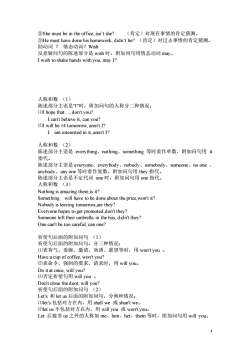
②She must be in the office, isn't she?(肯定)对现在事情的肯定猜测。③Hemusthavedonehishomework,didn'the?(肯定)对过去事情的肯定猜测。助动词?情态动词?Wish反意疑问句的陈述部分是wish时,附加问句用情态动词may。I wish to shake hands with you, may I?人称和数(1)陈述部分主语是"I"时,附加问句的人称分二种情况:(1)I hope that..., don't you?I can't believe it, can you?(2)I will be 14 tomorrow, aren't I?I am interested in it, aren't I?人称和数(2)陈述部分主语是everything、nothing、something等时看作单数,附加问句用it指代。陈述部分主语是everyone、everybody、nobody、somebody、someone、noone、anybody、anyone等时看作复数,附加问句用they指代。陈述部分主语是不定代词one时,附加问句用one指代。人称和数(3)Nothing is amazing there,is it?Somethingwill have to be done about the price,won't it?Nobodyisleavingtomorrow,arethey?Everyone hopes to get promoted,don't they?Someonelefttheirumbrella inthebus,didn'tthey?Onecan'tbetoocareful,canone?祈使句后面的附加问句(1)祈使句后面的附加问句,分三种情况(1)表客气、委婉、邀请、劝诱、愿望等时,用won'tyou。Have a cup of coffee, won't you?(2)表命令、强制的要求、请求时,用will you。Do it at once, will you?(3)否定祈使句用willyou。Don't close the door, will you?祈使句后面的附加问句(2)Let's和letus后面的附加问句,分两种情况;(1)let's包括对方在内,用shallwe或shan'twe。(2)letus不包括对方在内,用willyou或wontyou。Let后接非us之外的人称如me、him、her、them等时,附加问句用willyou。4
4 ②She must be in the office, isn’t she? (肯定)对现在事情的肯定猜测。 ③He must have done his homework, didn‘t he? (肯定)对过去事情的肯定猜测。 助动词 ? 情态动词?Wish 反意疑问句的陈述部分是 wish 时,附加问句用情态动词 may。 I wish to shake hands with you, may I? 人称和数 (1) 陈述部分主语是"I"时,附加问句的人称分二种情况: ⑴I hope that., don't you? I can't believe it, can you? ⑵I will be 14 tomorrow, aren't I? I am interested in it, aren't I? 人称和数 (2) 陈述部分主语是 everything、nothing、something 等时看作单数,附加问句用 it 指代。 陈述部分主语是 everyone、everybody、nobody、somebody、someone、no one 、 anybody、any one 等时看作复数,附加问句用 they 指代。 陈述部分主语是不定代词 one 时,附加问句用 one 指代。 人称和数 (3) Nothing is amazing there,is it? Something will have to be done about the price,won't it? Nobody is leaving tomorrow,are they? Everyone hopes to get promoted,don't they? Someone left their umbrella in the bus, didn't they? One can't be too careful, can one? 祈使句后面的附加问句 (1) 祈使句后面的附加问句,分三种情况; ⑴表客气、委婉、邀请、劝诱、愿望等时,用 won't you 。 Have a cup of coffee, won't you? ⑵表命令、强制的要求、请求时,用 will you。 Do it at once, will you? ⑶否定祈使句用 will you 。 Don't close the door, will you? 祈使句后面的附加问句 (2) Let's 和 let us 后面的附加问句,分两种情况; ⑴let's 包括对方在内,用 shall we 或 shan't we。 ⑵let us 不包括对方在内,用 will you 或 won't you。 Let 后接非 us 之外的人称如 me、him、her、them 等时,附加问句用 will you
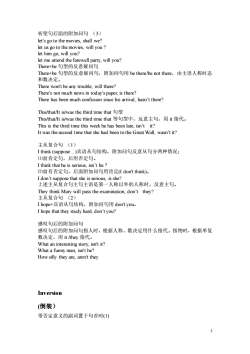
祈使句后面的附加问句(3)let's go to the movies, shall we?let us go to the movies, will you ?let him go, will you?letmeattendthefarewellparty,willyou?There+be句型的反意疑问句There+be句型的反意疑问句,附加问句用bethere/benotthere,由主语人称时态和数决定。There won't be any trouble, will there?There's not much news in today's paper, is there?There has been much confusion since his arrival, hasn't there?This/that/lt is/was thethird timethat句型This/that/Itis/wasthethirdtimethat等句型中,反意主句,用it指代。This isthethird timethis week hehas beenlate,isn'tit?Itwasthesecondtimethat shehadbeentotheGreatWall, wasn't it?主从复合句(1)Ithink(suppose...)宾语从句结构,附加问句反意从句分两种情况;(1)前肯定句,后用否定句。I think that he is serious, isn't he?(2)前有否定句,后面附加问句用肯定(Idon'tthink)。I don't suppose that she is serious, is she?上述主从复合句主句主语是第一人称以外的人称时,反意主句。They think Mary will pass the examination, don't they?主从复合句(2Ihope+宾语从句结构,附加问句用don'tyou。I hopethattheystudyhard,don'tyou?感叹句后的附加问句感叹句后的附加问句指人时,根据人称、数决定用什么指代。指物时,根据单复数决定,用it/they指代。What an interesting story, isn't it?What a funny man, isn't he?How silly they are, aren't theyInversion(倒装)带否定意义的副词置于句首时(1)5
5 祈使句后面的附加问句 (3) let's go to the movies, shall we? let us go to the movies, will you ? let him go, will you? let me attend the farewell party, will you? There+be 句型的反意疑问句 There+be 句型的反意疑问句,附加问句用 be there/be not there,由主语人称时态 和数决定。 There won't be any trouble, will there? There's not much news in today's paper, is there? There has been much confusion since his arrival, hasn’t there? This/that/It is/was the third time that 句型 This/that/It is/was the third time that 等句型中,反意主句,用 it 指代。 This is the third time this week he has been late, isn’t it? It was the second time that she had been to the Great Wall, wasn’t it? 主从复合句 (1) I think (suppose.)宾语从句结构,附加问句反意从句分两种情况; ⑴前肯定句,后用否定句。 I think that he is serious, isn’t he ? ⑵前有否定句,后面附加问句用肯定(I don't think)。 I don’t suppose that she is serious, is she? 上述主从复合句主句主语是第一人称以外的人称时,反意主句。 They think Mary will pass the examination, don’t they? 主从复合句 (2) I hope+宾语从句结构,附加问句用 don't you。 I hope that they study hard, don’t you? 感叹句后的附加问句 感叹句后的附加问句指人时,根据人称、数决定用什么指代。指物时,根据单复 数决定,用 it /they 指代。 What an interesting story, isn't it? What a funny man, isn't he? How silly they are, aren't they Inversion (倒装) 带否定意义的副词置于句首时(1)
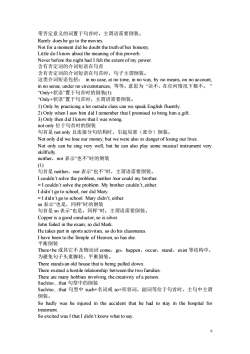
带否定意义的词置于句首时,主谓语需要倒装。Rarely does he go to the movies.Not for a moment did he doubt the truth of her honesty.Little doI know about the meaning of this proverbNever before the night had Ifelt the extent ofmy power.含有否定词的介词短语在句首含有否定词的介词短语在句首时,句子主谓倒装。这类介词短语包括:innocase,atnotime,innoway,bynomeans,onnoaccountinnosense,undernocircumstances,等等。意思为“决不,在任何情况下都不。“Only+状语"置于句首时的倒装(1)“Only+状语”置于句首时,主谓语需要倒装。1)Only by practicing a lot outside class can we speak English fluently.2) Only when I saw him did I remember that I promised to bring him a gift.3) Only then did I know that I was wrong.notonly位于句首时的倒装句首是notonly且连接分句结构时,引起局部(部分)倒装。Notonly did welose our money,but we were also in dangerof losing our livesNot only can he sing very well, but he can also play some musical instrument veryskillfully.neither,nor表示“也不"时的倒装(1)句首是neither,nor表示“也不"时,主谓语需要倒装。Icouldn'tsolvetheproblem,neither/norcouldmybrother=Icouldn't solve theproblem.Mybrother couldn't, eitherI didn't go to school, nor did Mary.= I didn't go to school Mary didn't. eitherSo表示“也是,同样"时的倒装句首是So表示“也是,同样"时,主谓语需要倒装。Copper is a good conductor, so is silver.John failed in the exam, so did MarkHe takes part in sports activities, so do his classmates.I havebeentotheTempleof Heaven,sohasshe平衡倒装There+be或其它不及物动词come,go,happen,occur,stand,exist等结构中,为避免句子头重脚轻,平衡倒装。There stands an old house that is being pulled downThere existed a hostile relationship between the two families.TherearemanyhobbiesinvolvingthecreativityofapersonSuch/so..that句型中的倒装Such/so...that句型中such+名词或so+形容词,副词等位于句首时,主句中主谓倒装。So badly was he injured in the accident that he had to stay in the hospital fortreatment.So excited was I that I didn't know what to say6
6 带否定意义的词置于句首时,主谓语需要倒装。 Rarely does he go to the movies. Not for a moment did he doubt the truth of her honesty. Little do I know about the meaning of this proverb. Never before the night had I felt the extent of my power. 含有否定词的介词短语在句首 含有否定词的介词短语在句首时,句子主谓倒装。 这类介词短语包括: in no case, at no time, in no way, by no means, on no account, in no sense, under no circumstances, 等等。意思为 “决不,在任何情况下都不。 ” “Only+状语”置于句首时的倒装(1) “Only+状语”置于句首时,主谓语需要倒装。 1) Only by practicing a lot outside class can we speak English fluently. 2) Only when I saw him did I remember that I promised to bring him a gift. 3) Only then did I know that I was wrong. not only 位于句首时的倒装 句首是 not only 且连接分句结构时,引起局部(部分)倒装。 Not only did we lose our money, but we were also in danger of losing our lives. Not only can he sing very well, but he can also play some musical instrument very skillfully. neither,nor 表示“也不”时的倒装 (1) 句首是 neither,nor 表示“也不”时,主谓语需要倒装。 I couldn’t solve the problem, neither /nor could my brother. = I couldn’t solve the problem. My brother couldn’t, either. I didn’t go to school, nor did Mary. = I didn’t go to school. Mary didn’t, either. so 表示“也是,同样”时的倒装 句首是 so 表示“也是,同样”时,主谓语需要倒装。 Copper is a good conductor; so is silver. John failed in the exam; so did Mark. He takes part in sports activities, so do his classmates. I have been to the Temple of Heaven, so has she. 平衡倒装 There+be 或其它不及物动词 come,go,happen,occur,stand,exist 等结构中, 为避免句子头重脚轻,平衡倒装。 There stands an old house that is being pulled down. There existed a hostile relationship between the two families. There are many hobbies involving the creativity of a person. Such/so.that 句型中的倒装 Such/so.that 句型中 such+名词或 so+形容词,副词等位于句首时,主句中主谓 倒装。 So badly was he injured in the accident that he had to stay in the hospital for treatment. So excited was I that I didn’t know what to say
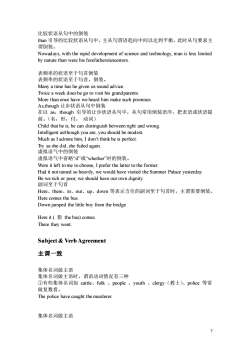
比较状语从句中的倒装than引导的比较状语从句中,主从句谓语趋向中间以达到平衡,此时从句要求主谓倒装。Nowadays, with the rapid development of science and technology, man is less limitedbynaturethanwerehisforefathers/ancestors表频率的状语至于句首倒装表频率的状语至于句首,倒装。Many a time has he given us sound adviceTwice a week does he go to visit his grandparents.More than once havewe heard him make such promisesAs,though让步状语从句中倒装在以as,though引导的让步状语从句中,从句常用倒装语序,把表语或状语提前。(名,形,付,动词)Child that he is, he can distinguish between right and wrong.Intelligent as/though you are, you should be modest.Much as I admire him, I don't think he is perfect.Try as she did, she failed again.虚拟语气中的倒装虚拟语气中省略"if"或“whether"时的倒装。Wereitlefttometochoose,Ipreferthelattertotheformer.Had it not rained so heavily, we would have visited the Summer Palace yesterdayBe we rich or poor, we should have our own dignity副词至于句首Here、there、in、out、up、down等表示方位的副词至于句首时,主谓需要倒装。Here comes thebus.Down jumped the little boy from the bridgeHere it(指thebus)comesThere they went.Subject&VerbAgreement主谓一致集体名词做主语集体名词做主语时,谓语动词情况有三种①有些集体名词如cattle、folk、people、youth、clergy(教士)、police等常做复数看。The police have caught themurderer集体名词做主语2
7 比较状语从句中的倒装 than 引导的比较状语从句中,主从句谓语趋向中间以达到平衡,此时从句要求主 谓倒装。 Nowadays, with the rapid development of science and technology, man is less limited by nature than were his forefathers/ancestors. 表频率的状语至于句首倒装 表频率的状语至于句首,倒装。 Many a time has he given us sound advice. Twice a week does he go to visit his grandparents. More than once have we heard him make such promises. As,though 让步状语从句中倒装 在以 as,though 引导的让步状语从句中,从句常用倒装语序,把表语或状语提 前。(名,形,付, 动词) Child that he is, he can distinguish between right and wrong. Intelligent as/though you are, you should be modest. Much as I admire him, I don’t think he is perfect. Try as she did, she failed again. 虚拟语气中的倒装 虚拟语气中省略“if”或“whether”时的倒装。 Were it left to me to choose, I prefer the latter to the former. Had it not rained so heavily, we would have visited the Summer Palace yesterday. Be we rich or poor, we should have our own dignity. 副词至于句首 Here、there、in、out、up、down 等表示方位的副词至于句首时,主谓需要倒装。 Here comes the bus. Down jumped the little boy from the bridge. Here it ( 指 the bus) comes. There they went. Subject & Verb Agreement 主谓一致 集体名词做主语 集体名词做主语时,谓语动词情况有三种 ①有些集体名词如 cattle、folk 、people 、youth 、clergy(教士)、police 等常 做复数看。 The police have caught the murderer. 集体名词做主语
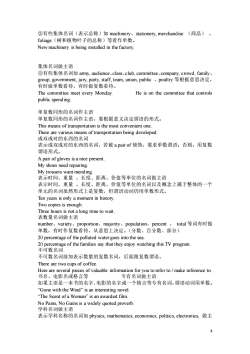
②有些集体名词(表示总称)如machinery、stationery,merchandise(商品)foliage(树和植物叶子的总称)等看作单数。New machinery is being installed in thefactory集体名词做主语③有些集体名词如army,audience、class、club,committee、company,crowd,familygroup,governmentjury,partystaff,team,union,publicpoultry等根据意思决定,有时做单数看待,有时做复数看待。The committee meet every MondayHeisonthecommitteethatcontrolspublic spend ing单复数同形的名词作主语单复数同形的名词作主语,要根据意义决定谓语的形式。This means of transportation is the most convenient one.Therearevariousmeans oftransportationbeingdeveloped成双成对的东西的名词表示成双成对的东西的名词,若被apairof修饰,要求单数谓语;否则,用复数谓语形式。A pair of gloves is a nice presentMy shoes need repairing.Mytrouserswantmending表示时间、重量、长度、距离、价值等单位的名词做主语表示时间、重量、长度、距离、价值等单位的名词以及概念上属于整体的一个单元的名词虽然形式上是复数,但谓语动词仍用单数形式。Ten years is only a moment in history.Two copies is enough.Three hours is not a long timeto wait.表数量名词做主语number、variety、proportion、majority、population、percent、total等词有时做单数,有时作复数看待,从意思上决定。(分数、百分数、部分)20 percentage of the polluted water goes into the sea20percentageofthefamiliessaythattheyenjoywatchingthisTVprogram.不可数名词不可数名词前加表示数量的复数名词,后面跟复数谓语。There are two cups of coffee.Here are several pieces of valuable information for you to refer to /make reference to.书名、电影名或格言等专有名词做主语如果主语是一本书的名字、电影的名字或一个格言等专有名词,谓语动词用单数。"Gone with the Wind” is an interesting novel“TheScentofaWomanisanawardedfilmNoPains,NoGains is awidelyquoted proverb学科名词做主语表示学科名称的名词如physics,mathematics,economics,politics,electronics,做主8
8 ②有些集体名词(表示总称)如 machinery、stationery, merchandise (商品) 、 foliage(树和植物叶子的总称)等看作单数。 New machinery is being installed in the factory. 集体名词做主语 ③有些集体名词如 army, audience、class、club, committee、company, crowd, family、 group, government, jury, party, staff, team, union, public 、poultry 等根据意思决定, 有时做单数看待,有时做复数看待。 The committee meet every Monday. He is on the committee that controls public spending. 单复数同形的名词作主语 单复数同形的名词作主语,要根据意义决定谓语的形式。 This means of transportation is the most convenient one. There are various means of transportation being developed. 成双成对的东西的名词 表示成双成对的东西的名词,若被 a pair of 修饰,要求单数谓语;否则,用复数 谓语形式。 A pair of gloves is a nice present. My shoes need repairing. My trousers want mending. 表示时间、重量 、长度、距离、价值等单位的名词做主语 表示时间、重量 、长度、距离、价值等单位的名词以及概念上属于整体的一个 单元的名词虽然形式上是复数,但谓语动词仍用单数形式。 Ten years is only a moment in history. Two copies is enough. Three hours is not a long time to wait. 表数量名词做主语 number、variety、proportion、majority、population、percent 、 total 等词有时做 单数,有时作复数看待,从意思上决定。(分数、百分数、部分) 20 percentage of the polluted water goes into the sea. 20 percentage of the families say that they enjoy watching this TV program. 不可数名词 不可数名词前加表示数量的复数名词,后面跟复数谓语。 There are two cups of coffee. Here are several pieces of valuable information for you to refer to / make reference to. 书名、电影名或格言等 专有名词做主语 如果主语是一本书的名字、电影的名字或一个格言等专有名词,谓语动词用单数。 “Gone with the Wind” is an interesting novel. “The Scent of a Woman” is an awarded film. No Pains, No Gains is a widely quoted proverb. 学科名词做主语 表示学科名称的名词如 physics, mathematics, economics, politics, electronics, 做主
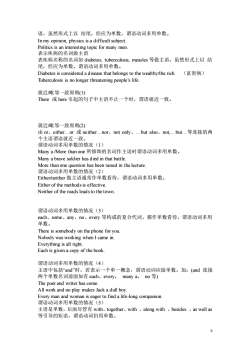
语,虽然形式上以结尾,但应为单数,谓语动词多用单数。In my opinion, physics is a difficult subject.Politics is an interesting topic formany men表示疾病的名词做主语表疾病名称的名词如diabetes,tuberculosis,measles等做主语,虽然形式上以结尾,但应为单数,谓语动词多用单数。(富贵病)Diabetes is considered adisease that belongs to the wealthy/the rich.Tuberculosis is no longerthreatening people's life.就近/毗邻一致原则(1)There或here引起的句子中主语不止一个时,谓语就近一致。就近/毗邻一致原则(2)由or、either...or或neither...nor、notonly、...butalso、not...but...等连接的两个主语谓语就近一致。谓语动词多用单数的情况(1)Manya/Morethanone所修饰的名词作主语时谓语动词多用单数。Manyabravesoldierhasdied inthatbattleMore than one question has been raised in the lecture谓语动词多用单数的情况(2)Either/neither做主语通常作单数看待,谓语动词多用单数。EitherofthemethodsiseffectiveNeither of theroadsleadstothetown谓语动词多用单数的情况(3)each、some、any、no、every等构成的复合代词,都作单数看待,谓语动词多用单数。There is somebody on the phone for youNobody was working when I came inEverything is all right.Each is given a copy of the book谓语动词多用单数的情况(4)主语中包括“and"时,若表示一个单一概念,谓语动词应做单数。加:(and连接两个单数名词前面如有each、every,manya,no等)The poet and writer has come.All work and no play makes Jack a dull boy.Everyman andwoman is eagertofinda life-long companion谓语动词多用单数的情况(5)主语是单数,后面尽管有with、together、with、alongwith、besides、aswellas等引导的短语,谓语动词仍用单数。9
9 语,虽然形式上以 结尾,但应为单数,谓语动词多用单数。 In my opinion, physics is a difficult subject. Politics is an interesting topic for many men. 表示疾病的名词做主语 表疾病名称的名词如 diabetes, tuberculosis, measles 等做主语,虽然形式上以 结 尾,但应为单数,谓语动词多用单数。 Diabetes is considered a disease that belongs to the wealthy/the rich. (富贵病) Tuberculosis is no longer threatening people’s life. 就近/毗邻一致原则(1) There 或 here 引起的句子中主语不止一个时,谓语就近一致。 就近/毗邻一致原则(2) 由 or、either.or 或 neither.nor、not only、.but also、not,.but.等连接的两 个主语谓语就近一致。 谓语动词多用单数的情况(1) Many a /More than one 所修饰的名词作主语时谓语动词多用单数。 Many a brave soldier has died in that battle. More than one question has been raised in the lecture. 谓语动词多用单数的情况(2) Either/neither 做主语通常作单数看待,谓语动词多用单数。 Either of the methods is effective. Neither of the roads leads to the town. 谓语动词多用单数的情况(3) each、some、any、no、every 等构成的复合代词,都作单数看待,谓语动词多用 单数。 There is somebody on the phone for you. Nobody was working when I came in. Everything is all right. Each is given a copy of the book. 谓语动词多用单数的情况(4) 主语中包括“and”时,若表示一个单一概念,谓语动词应做单数。加:(and 连接 两个单数名词前面如有 each、every, many a, no 等) The poet and writer has come. All work and no play makes Jack a dull boy. Every man and woman is eager to find a life-long companion. 谓语动词多用单数的情况(5) 主语是单数,后面尽管有 with、together、with 、along with 、besides 、as well as 等引导的短语,谓语动词仍用单数
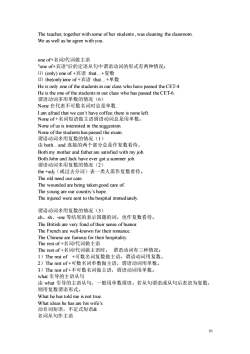
The teacher, together with some of her students, was cleaning the classroomWe as well as he agree with youoneof+名词/代词做主语"oneof+宾语"后的定语从句中谓语动词的形式有两种情况(1)(only)oneof+宾语that...+复数(2)the(only)oneof+宾语that...+单数He is only one of the students in our class who have passed the CET-4.He is the one of the students in our class who has passed the CET-6.谓语动词多用单数的情况(6)None在代表不可数名词时总是单数I am afraid that we can't have coffee, there is none left.Noneof+名词短语做主语谓语动词总是用单数。None ofus is interested in the suggestionNoneofthe students has passed theexam.谓语动词多用复数的情况(1)由both...and连接的两个部分总是作复数看待。Both my mother and father are satisfied with my jobBothJohn and Jack have evergota summer job谓语动词多用复数的情况(2)the+adi(或过去分词)表一类人需作复数看待。The old need our care.The wounded are being taken good care of.The young are our country's hope.The injured were sent tothehospital immediately谓语动词多用复数的情况(3)ch、sh、-ese等结尾的表示国籍的词,也作复数看待。The British are very fond of their sense of humor.The French are well-known for their romanceThe Chinese are famous for their hospitalityTherestof+名词/代词做主语Therestof+名词/代词做主语时,谓语动词有三种情况:1)Therestof+可数名词复数做主语,谓语动词用复数。2)Therestof+可数名词单数做主语,谓语动词用单数。3)Therestof+不可数名词做主语,谓语动词用单数。what引导的主语从句由what引导的主语从句,一般用单数谓语。若从句谓语或从句后表语为复数,则用复数谓语形式。What he has told me is not trueWhat ideas he has are his wife's动名词短语,不定式短语&名词从句作主语10
10 The teacher, together with some of her students , was cleaning the classroom. We as well as he agree with you. one of+名词/代词做主语 "one of+宾语"后的定语从句中谓语动词的形式有两种情况: ⑴ (only) one of +宾语 that.+复数 ⑵ the(only)one of +宾语 that.+单数 He is only one of the students in our class who have passed the CET-4. He is the one of the students in our class who has passed the CET-6. 谓语动词多用单数的情况(6) None 在代表不可数名词时总是单数. I am afraid that we can’t have coffee; there is none left. None of +名词短语做主语谓语动词总是用单数。 None of us is interested in the suggestion. None of the students has passed the exam. 谓语动词多用复数的情况(1) 由 both.and 连接的两个部分总是作复数看待。 Both my mother and father are satisfied with my job. Both John and Jack have ever got a summer job. 谓语动词多用复数的情况(2) the +adj(或过去分词)表一类人需作复数看待。 The old need our care. The wounded are being taken good care of. The young are our country’s hope. The injured were sent to the hospital immediately. 谓语动词多用复数的情况(3) ch、sh、-ese 等结尾的表示国籍的词,也作复数看待。 The British are very fond of their sense of humor. The French are well-known for their romance. The Chinese are famous for their hospitality. The rest of +名词/代词做主语 The rest of +名词/代词做主语时, 谓语动词有三种情况: 1)The rest of +可数名词复数做主语,谓语动词用复数。 2)The rest of +可数名词单数做主语,谓语动词用单数。 3)The rest of +不可数名词做主语,谓语动词用单数。 what 引导的主语从句 由 what 引导的主语从句,一般用单数谓语。若从句谓语或从句后表语为复数, 则用复数谓语形式。 What he has told me is not true. What ideas he has are his wife’s. 动名词短语,不定式短语& 名词从句作主语
按次数下载不扣除下载券;
注册用户24小时内重复下载只扣除一次;
顺序:VIP每日次数-->可用次数-->下载券;
- 《大学基础英语》课程教学资源(教学大纲)英语专业四级词.doc
- 《大学基础英语》课程教学资源(教学大纲)英语专业四级考试大纲.doc
- 《大学英语教程》课程教材配套电子教案(PPT教学课件,北大版)第四册 第五单元.pptx
- 《大学英语教程》课程教材配套电子教案(PPT教学课件,北大版)第一册 第一单元.pptx
- 《大学英语教程》课程教材配套电子教案(PPT教学课件,北大版)第三册 第七单元.pptx
- 《大学英语教程》课程教材配套电子教案(PPT教学课件,北大版)第三册 第八单元.pptx
- 《大学英语教程》课程教材配套电子教案(PPT教学课件,北大版)第三册 第二单元.pptx
- 《大学英语教程》课程教材配套电子教案(PPT教学课件,北大版)第三册 第三单元.pptx
- 《大学英语教程》课程教材配套电子教案(PPT教学课件,北大版)第三册 第一单元.pptx
- 《大学英语教程》课程教材配套电子教案(PPT教学课件,北大版)第一册 第二单元.pptx
- 《大学英语教程》课程教材配套电子教案(PPT教学课件,北大版)第四册 第四单元.pptx
- 《大学英语教程》课程教材配套电子教案(PPT教学课件,北大版)第一册 第三单元.pptx
- 《大学英语教程》课程教材配套电子教案(PPT教学课件,北大版)第四册 第八单元.pptx
- 《大学英语教程》课程教材配套电子教案(PPT教学课件,北大版)第一册 第四单元.pptx
- 《大学英语》课程教学大纲(College English).pdf
- 《大学英语翻译》课程PPT教学课件(口译)Module 4 Escort & liaison interpreting(Exercise).ppt
- 《大学英语翻译》课程PPT教学课件(口译)Module 1 Introduction to interpreting course & lead-in.ppt
- 《大学英语翻译》课程PPT教学课件(口译)Module 2-2 sight translation(speed control).ppt
- 《大学英语翻译》课程PPT教学课件(口译)Module 2-1 sight translation(specific skills).ppt
- 《大学英语翻译》课程PPT教学课件(口译)Module 3 memory & summarizing.ppt
- 《大学基础英语》课程教学资源(试卷习题)2005-2010英语专业四级真题(无答案).doc
- 《大学基础英语》课程教学资源(教学大纲)基础英语一.doc
- 《大学基础英语》课程教学资源(教学大纲)基础英语二.doc
- 《大学基础英语》课程教学资源(教学大纲)基础英语三.doc
- 《大学基础英语》课程教学资源(教学大纲)基础英语四.doc
- 《大学基础英语》课程教学资源(授课教案)基础英语教案一.doc
- 《大学基础英语》课程教学资源(授课教案)基础英语教案二.doc
- 《大学基础英语》课程教学资源(授课教案)基础英语教案四.doc
- 《大学基础英语》课程教学资源(授课教案)基础英语教案三.doc
- 《大学基础英语》课程PPT教学课件(一)Lesson 11 The Midnight Visitor.ppt
- 《大学基础英语》课程PPT教学课件(一)Lesson 7 Mandela's Garden.ppt
- 《大学基础英语》课程PPT教学课件(一)Lesson 5 Angels on a Pin.ppt
- 《大学基础英语》课程PPT教学课件(一)Lesson 8 My Personal Manager.ppt
- 《大学基础英语》课程PPT教学课件(一)Lesson Three Message of the Land.ppt
- 《大学基础英语》课程PPT教学课件(一)Lesson one Half A Day.ppt
- 《大学基础英语》课程PPT教学课件(一)Lesson 2 Going Home.ppt
- 《大学基础英语》课程PPT教学课件(二)Lesson Nine Quick Fix Society.ppt
- 《大学基础英语》课程PPT教学课件(二)Lesson Eleven You Have To Get Me Out Of Here.ppt
- 《大学基础英语》课程PPT教学课件(二)Lesson Ten The Richer, the Poorer.ppt
- 《大学基础英语》课程PPT教学课件(二)Lesson Seven The Greatest Invention.ppt
